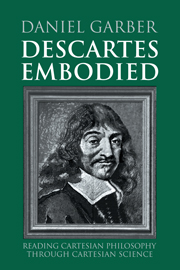Book contents
- Frontmatter
- Contents
- Acknowledgments
- Abbreviations, Citations, and Translations
- Introduction
- Part I Historiographical Preliminaries
- Part II Method, Order, and Certainty
- Part III Mind, Body, and the Laws of Nature
- Part IV Larger Visions
- 13 Descartes, or the Cultivation of the Intellect
- 14 Experiment, Community, and the Constitution of Nature in the Seventeenth Century
- Sources
- Index
13 - Descartes, or the Cultivation of the Intellect
Published online by Cambridge University Press: 10 November 2009
- Frontmatter
- Contents
- Acknowledgments
- Abbreviations, Citations, and Translations
- Introduction
- Part I Historiographical Preliminaries
- Part II Method, Order, and Certainty
- Part III Mind, Body, and the Laws of Nature
- Part IV Larger Visions
- 13 Descartes, or the Cultivation of the Intellect
- 14 Experiment, Community, and the Constitution of Nature in the Seventeenth Century
- Sources
- Index
Summary
René Descartes (1596–1650) aimed to sweep away the past, and start philosophy anew. Much of what made Descartes important for his contemporaries, and for us as well, concerns the contents of his philosophy. Descartes' philosophy was directed squarely against the Aristotelian philosophy taught in the Schools of his day. For the Aristotelians, all cognition begins in sensation: Everything in the intellect comes first through the senses. Descartes' philosophy, on the other hand, emphasizes the priority of reason over the senses. Furthermore, Descartes substitutes a purely mechanical world of geometric bodies governed by laws of motion for an almost animistic world of Aristotelian substances with innate tendencies to different kinds of behavior. These original doctrines, together with his work in metaphysics, optics, mathematics, the theory of the passions, among other areas, made Descartes a central figure in his age.
But in this essay I would like to concentrate on something different. Descartes opposed himself not only to the content of the philosophy of the Schools, but to their very conception of what knowledge is and how it is to be transmitted. Connected with the new Cartesian philosophy is a genuine philosophy of education, a conception of the aims and goals of education very different from the one that dominated the School where Descartes himself had been educated as a youth. My project in this essay is to tease out some aspects of this philosophy.
Rejecting Authority
Let us begin with one of Descartes' most important texts, the Discourse on the Method of Rightly Conducting One's Reason and Seeking the Truth in the Sciences, published in 1637 as the introduction to three scientific texts, the Geometry, the Dioptrics, and the Meteors.
- Type
- Chapter
- Information
- Descartes EmbodiedReading Cartesian Philosophy through Cartesian Science, pp. 277 - 295Publisher: Cambridge University PressPrint publication year: 2000



